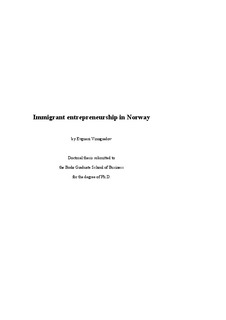Immigrant entrepreneurship in Norway
Doctoral thesis
Permanent lenke
http://hdl.handle.net/11250/140348Utgivelsesdato
2008Metadata
Vis full innførselSamlinger
Originalversjon
Vinogradov, E. (2008). Immigrant entrepreneurship in Norway (Doctoral thesis). Bodø Graduate School of BusinessSammendrag
The purpose of this doctoral thesis is to add to the knowledge about immigrant entrepreneurship in Norway and to test the existing theories relating to immigrant entrepreneurship. In this work, an immigrant entrepreneur is defined as a business owner born outside Norway with both parents born abroad who is involved into the activities characterised by economic innovation, organisation creation, and profit-seeking in the market sector.
Four papers are included in this dissertation. The first paper focuses on relationships between national culture, home-country educational attainment and intergroup differences in self-employment levels. The next paper investigates the reasons why immigrant owned firms demonstrate lower survival rate then the firms owned by native Norwegians. The question of selective migration and brain drain is in focus for the paper utilising primary data on representative samples of Russian immigrants to Norway and their stay-at-home peers. The methodological paper is devoted to the ethical aspects of research on immigrant entrepreneurs.
The findings indicate that immigrants’ home-country national culture and educational attainment are good predictors of intergroup differences in self-employment levels. The findings on business survival suggest that both propensity to engage into self-employment and ability to survive as self-employed may determine the current level of self-employment in an immigrant group. The findings also indicate the presence of selective migration with respect to entrepreneurial characteristics. As considering ethics of research on immigrant entrepreneurs, lower average levels of education, unfamiliarity with local culture and social context, economic dependency, links to the home country and coethnic community, special legal position, and linguistic disadvantages are identified as potential sources of ethical ambiguity. Several implications of this thesis may be useful for practitioners and policy makers in sending and receiving countries.
Beskrivelse
Doctoral thesis (Ph.D.) – Bodø Graduate School of Business, 2008
Består av
Paper I: Vinogradov, E. and Kolvereid, L. (2007). Cultural background, human capital and self-employment rates among immigrants in Norway. Entrepreneurship and Regional Development, 19(4), 359-376. doi: 10.1080/08985620701223213. Full text not available in Brage Nord.Paper II: Vinogradov, E. and Isaksen, E.J. (2008). Survival of new firms owned by natives and immigrants in Norway. Journal of Developmental Entrepreneurship, 13(1), 21-38. doi: 10.1142/S1084946708000831. Full text not available in Brage Nord.
Paper III: Vinogradov, E. and Gabelko, M. (2010). Entrepreneurship among Russian immigrants in Norway and their stay-at-home peers. Journal of Developmental Entrepreneurship, 15(4), 461-479. doi: 10.1142/S108494671000166X. Full text not available in Brage Nord.
Paper IV: Vinogradov, E. (2011). Ethical aspects of research on ethnic/immigrant entrepreneurship. Entrepreneurship Research Journal, 1(3). doi: 10.2202/2157-5665.1017. Full text not available in Brage Nord.
